Findymail Alternatives
An in-depth comparison of 10 Findymail alternatives. We analyze features, price, and data accuracy to help you choose the best tool.

Many people use Findymail for good reasons. It's a solid tool, praised for its ease of use and high data accuracy. It excels at providing verified emails, which helps keep your outreach deliverability safe and your bounce rates low.
But no tool is perfect. Some users find it can be expensive or offer limited contact information. We've analyzed the top alternatives based on G2 reviews to help you find the right fit for your needs. Let's get started.
Explore 11x Digital Workers For Sales
If your team wants to use digital workers for sales, consider 11x. It offers a way to delegate specific sales tasks. This approach can support your existing sales force and its operations.
11x is a go-to-market platform that uses AI agents to manage sales tasks. An agent named Alice finds prospects, runs outreach on email and LinkedIn, and keeps your CRM current. Julian, another agent, qualifies inbound leads and books meetings.
The platform unifies data enrichment, outreach, and email warmup. This can replace multiple point solutions in a conventional GTM stack, bringing these tasks into one system.
Findymail Alternatives
Below, we review the top Findymail alternatives in detail. We cover each tool's pricing, main features, and how it stacks up against Findymail with its own advantages and potential drawbacks.
1) Hunter
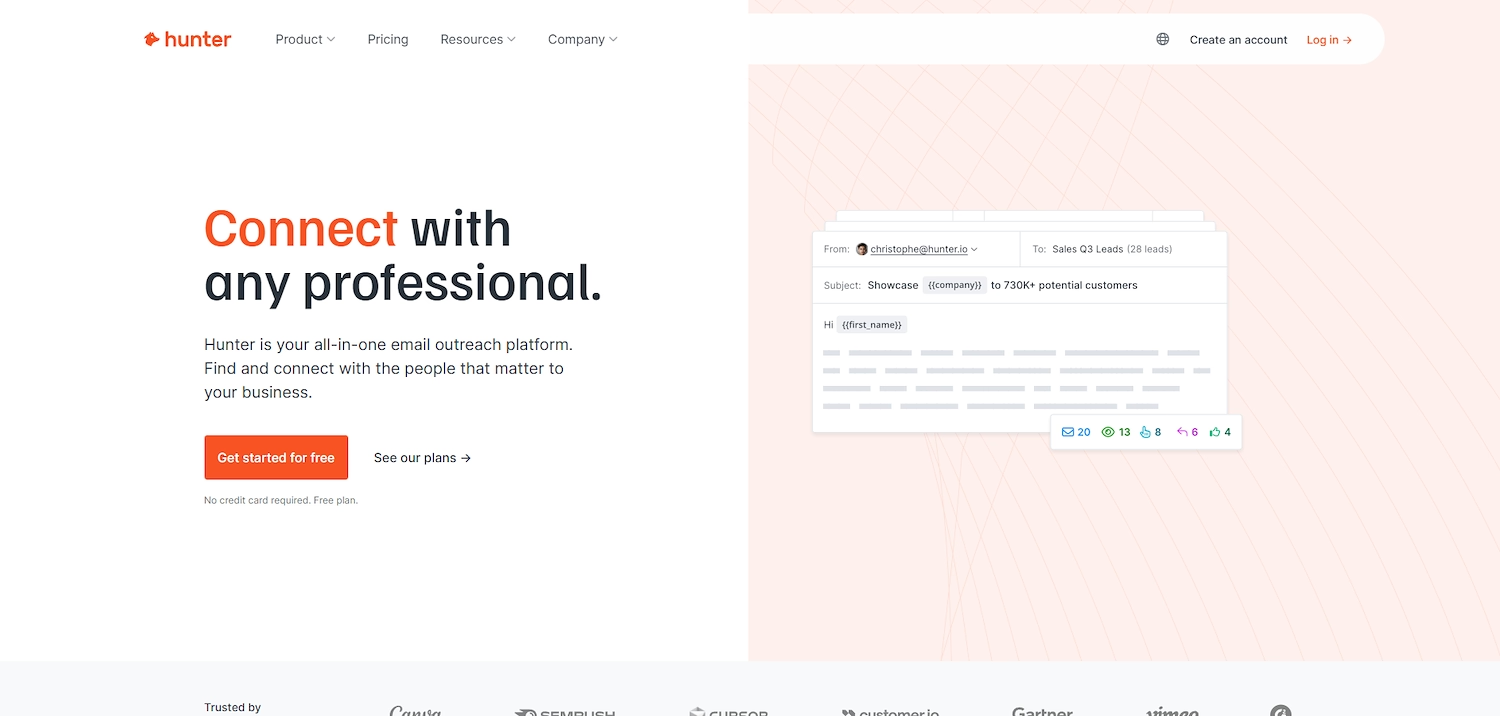
Hunter is an email outreach and lead generation platform. It helps businesses identify B2B prospects and locate their verified email addresses. The tool allows you to run cold-email campaigns and keep data compliant with regulations.
Common uses include the creation of prospect lists for sales and the discovery of decision-makers at a company. It also validates email lists before a campaign.
Hunter's Main Features
- Composes personalized messages, schedules follow-ups, and tracks performance analytics from a Gmail, Google Workspace, or Outlook account.
- Surfaces prospects who show buying signals through an intent-data module.
- Lists websites based on the technology stack they use.
- Connects with CRMs and Zapier, offers a Google Sheets add-on, and provides a public REST API reaching over 5,000 destinations.
Hunter vs. Findymail: Key Differences
Average Review Score: 4.4/5 stars based on 592 G2 reviews.
- Hunter includes a built-in platform to send cold email campaigns. This is different from Findymail, which focuses on email discovery and requires a separate outreach tool.
- It offers a free plan, which can be a factor for users on a tight budget. Findymail, in comparison, is a paid-only service.
- The tool has an intent-data feature to identify prospects who show buying signals. This provides a different type of lead source compared to Findymail.
- A technology lookup feature lets you find leads based on their website's tech stack. This is a specific search filter not available in Findymail.
Hunter's Limitations Compared To Findymail
- Some users report that Hunter's data accuracy can be inconsistent. This may lead to a higher bounce rate compared to Findymail, which specializes in providing highly verified emails.
- The platform bundles email finding with a full outreach suite. For teams that already use a separate sales engagement tool, this means paying for features they do not need.
- As an all-in-one solution, the tool can be more complex. Teams that only require email discovery might find Findymail's focused and more direct interface to be a better fit for their workflow.
Pricing and Cost-Effectiveness
Hunter's Starter plan matches Findymail's Basic plan at $49 per month, for which Findymail provides 1,000 emails. For larger needs, Findymail's 5,000-email plan at $99 per month is priced lower than Hunter's Growth plan at $149 per month.
2) Apollo.io

Apollo.io is a sales intelligence and engagement platform. It provides a database of contacts and companies that sales teams use to find prospects, build lists, and manage outreach campaigns.
The platform integrates data discovery with workflow tools. This combination supports the sales process from a single interface, which can replace several separate applications for a go-to-market team.
Apollo.io's Main Features
- Searches a database of contacts and companies using dozens of data attributes for list building.
- Builds and automates multi-step outreach sequences across email, phone, and social media channels.
- Scores leads with custom rules and tracks engagement analytics to identify high-priority prospects.
- Integrates with CRMs like Salesforce and HubSpot for automatic data syncing and workflow management.
Apollo.io vs. Findymail: Key Differences
Average Review Score: 4.7/5 stars based on 8,904 G2 reviews.
- Apollo.io integrates a full sales engagement suite for outreach. This is different from Findymail, which focuses on email discovery and requires a separate tool for campaign execution.
- The platform offers a free plan, which is an option for users with no budget. In contrast, Findymail is a paid-only service.
- It provides a large B2B database of over 210 million contacts. This gives a broader search scope compared to Findymail's focused email discovery.
- The tool has lead scoring features to help sales teams prioritize prospects. Findymail supplies contact data but lacks tools for lead qualification or scoring.
Apollo.io's Limitations Compared To Findymail
- Some users report that Apollo.io's data accuracy can be inconsistent. This might lead to a higher bounce rate than with Findymail, which specializes in providing highly verified emails to ensure deliverability.
- The tool's all-in-one nature can be complex for teams that only need email discovery. Findymail offers a more direct interface focused solely on finding emails, which can be a better fit for a simple workflow.
- Teams with an existing sales engagement tool might pay for redundant features with Apollo.io. In contrast, Findymail integrates with other tools, so users only pay for the email discovery function they need.
Pricing and Cost-Effectiveness
Apollo.io's Basic plan matches Findymail's at $49 per month, but its credit system differs due to its all-in-one nature. While Findymail provides 1,000 emails for this price, Apollo's value is spread across its suite of features. For a complete breakdown of its plans, visit Apollo.io's official website.
3) Snov.io
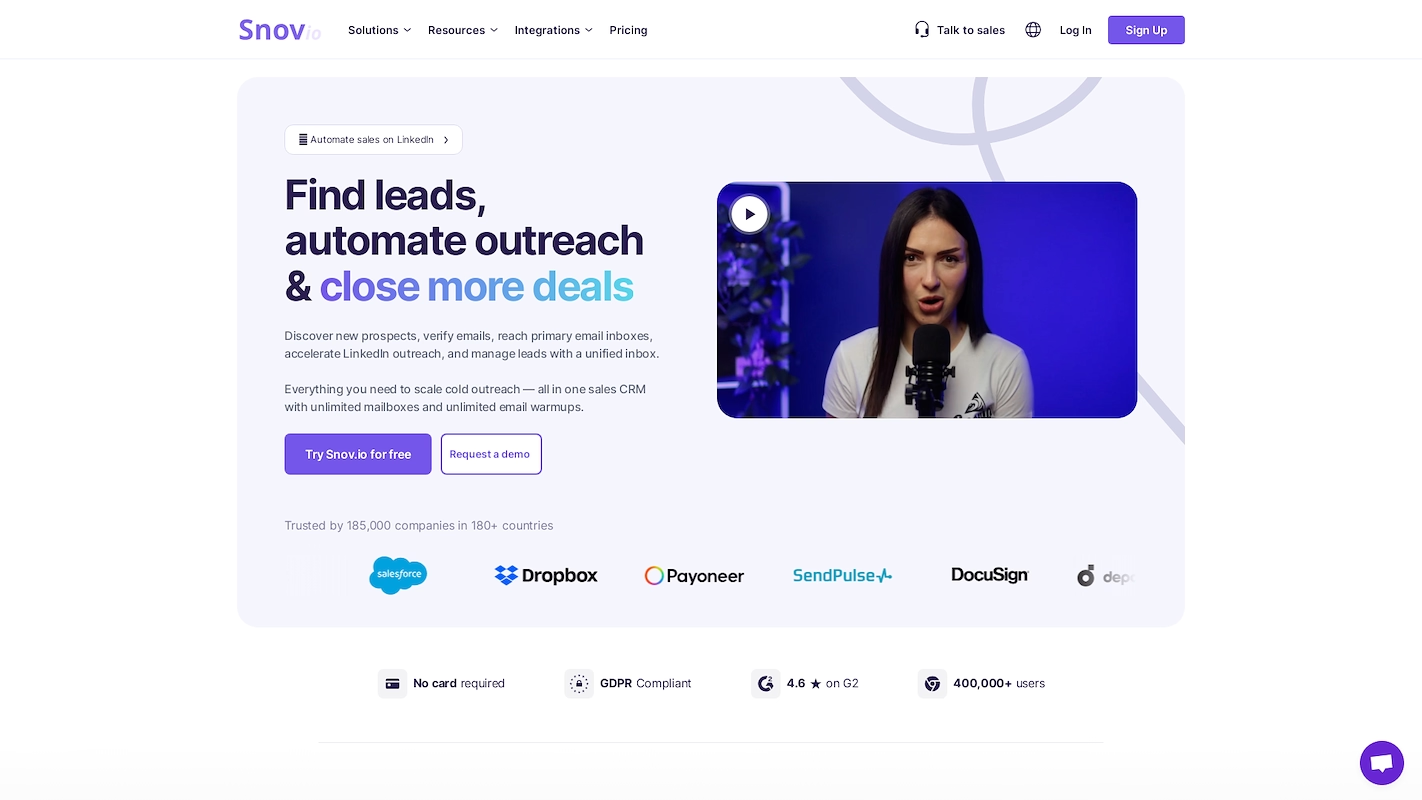
Snov.io is an all-in-one sales platform that unifies lead generation, email verification, and outreach. It helps businesses find leads, automate outreach, and manage deals within a single workspace that includes a built-in sales CRM.
The platform provides an Email Finder to build prospect lists and a 7-tier Email Verifier to maintain data quality. It also supports multichannel campaigns across email and LinkedIn.
Snov.io's Main Features
- Manages deals with a built-in sales CRM that syncs with Google Calendar and automates deal stages.
- Automates LinkedIn actions and InMail outreach with a safe cloud mode for large-scale personalization.
- Optimizes deliverability with an automated warm-up tool, domain checkers, and personalized tips.
- Connects with over 5,000 applications, including HubSpot and Salesforce, through native integrations and a REST API.
Snov.io vs. Findymail: Key Differences
Average Review Score: 4.6/5 stars based on 450 G2 reviews.
- Snov.io is an all-in-one platform that includes outreach tools. This is different from Findymail, which focuses on email discovery and requires a separate sales engagement tool.
- The platform has a built-in sales CRM to manage deals and pipelines. In contrast, Findymail needs to integrate with an external CRM for this function.
- It offers LinkedIn automation to engage with prospects on social media. This feature is not available in Findymail, which concentrates on the discovery of email addresses.
- An email warm-up tool is included to improve deliverability. Findymail supports deliverability with verified emails but does not offer a warm-up feature.
- Snov.io provides a free plan for users to test its features. Findymail, on the other hand, is a paid-only service.
Snov.io's Limitations Compared To Findymail
- Some users note that Snov.io's data accuracy can be inconsistent. This may lead to a higher bounce rate compared to Findymail, which specializes in verified emails to ensure high deliverability.
- The platform's all-in-one design can be complex for teams that only need email discovery. Findymail provides a more direct interface focused on this single task, which can fit a simple workflow better.
- Since Snov.io is a full suite, teams with an existing sales engagement tool might pay for features they do not use. In contrast, Findymail integrates with other tools, so users only pay for the email discovery function.
Pricing and Cost-Effectiveness
Snov.io's Pro 5k plan matches Findymail's Starter plan at $99 for 5,000 credits. Its entry-level plan is more affordable at $39 per month, but credits are used across a full suite of tools, not just for email discovery. For a detailed breakdown, visit Snov.io's official website.
4) Lusha
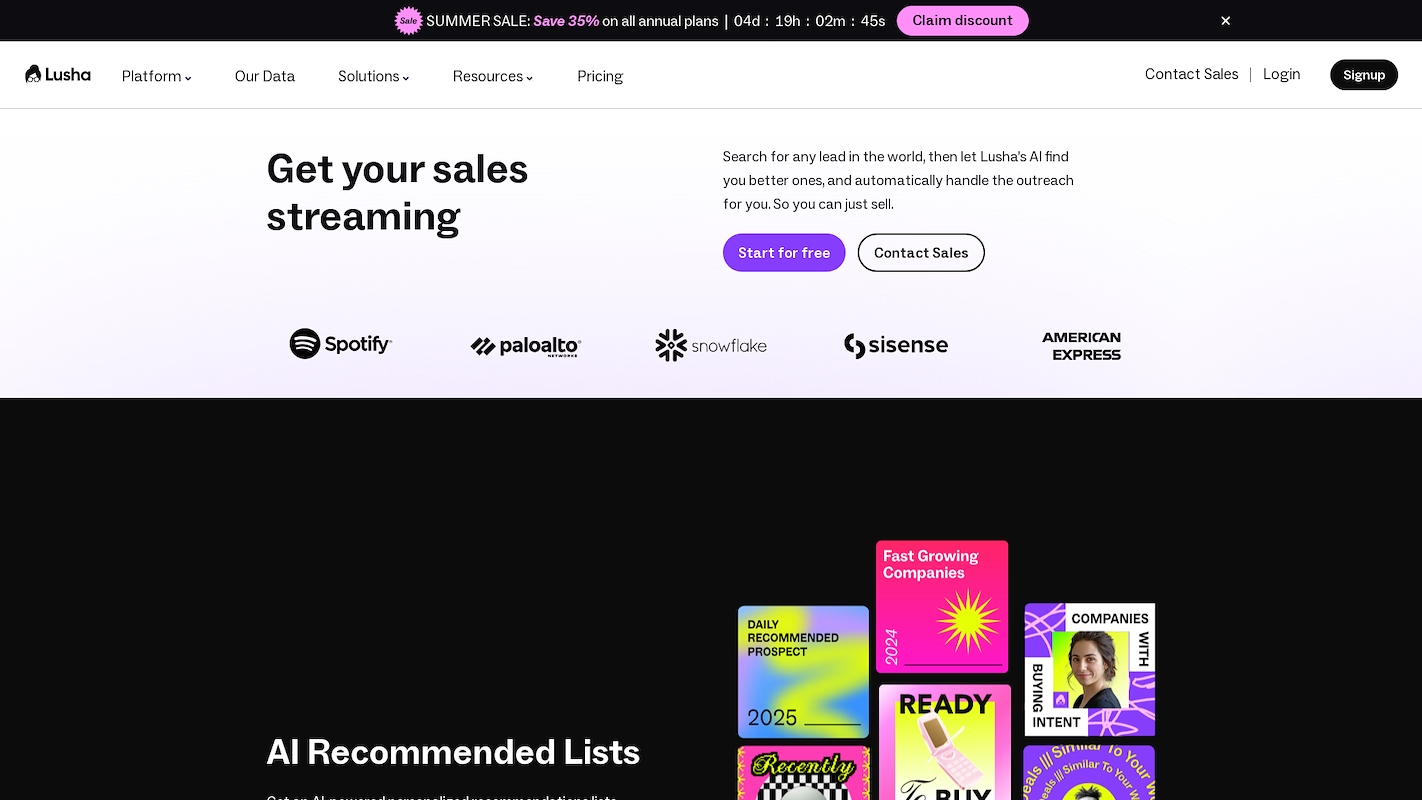
Lusha is a sales intelligence platform that provides B2B contact and company data. Sales, marketing, and recruitment teams use it to find direct phone numbers and email addresses for prospects and candidates.
The tool supports CRM data enrichment and the creation of targeted lists for account-based marketing campaigns.
Lusha's Main Features
- Generates daily, ICP-based lists of companies and decision-makers with an AI recommendation engine.
- Identifies in-market buyers and sends real-time notifications based on intent triggers.
- Automates and personalizes email sequences using AI-generated copy.
- Records and analyzes sales meetings to provide insights.
Lusha vs. Findymail: Key Differences
Average Review Score: 4.3/5 stars based on 1,516 G2 reviews.
- Lusha provides direct phone numbers in addition to emails, offering an extra contact channel compared to Findymail's email-only focus.
- It offers a free plan, which allows users to test the platform without a financial commitment. In contrast, Findymail is a paid-only service.
- The platform identifies prospects who show buying signals through intent data, providing a different type of lead source than Findymail's direct contact discovery.
- An AI engine automatically generates daily prospect lists based on an ideal customer profile. This is different from Findymail, where users build their lists manually.
Lusha's Limitations Compared To Findymail
- Some users report that Lusha's data accuracy can be inconsistent. This may lead to a higher bounce rate compared to Findymail, which specializes in providing highly verified emails to ensure deliverability.
- Its all-in-one design can be complex for teams that only need email discovery. Findymail offers a more direct interface focused on this single task, which can fit a simple workflow better.
- Since Lusha is a full suite, teams with an existing sales engagement tool might pay for features they do not use. In contrast, Findymail integrates with other tools, so users only pay for the email discovery function.
Pricing and Cost-Effectiveness
Lusha's entry-level Pro plan at $36 per month is more affordable than Findymail's Basic plan at $49 per month. Lusha's credits apply to its full suite, while Findymail's plan provides 1,000 verified emails, which presents a more straightforward cost for email discovery alone.
5) ZoomInfo Sales
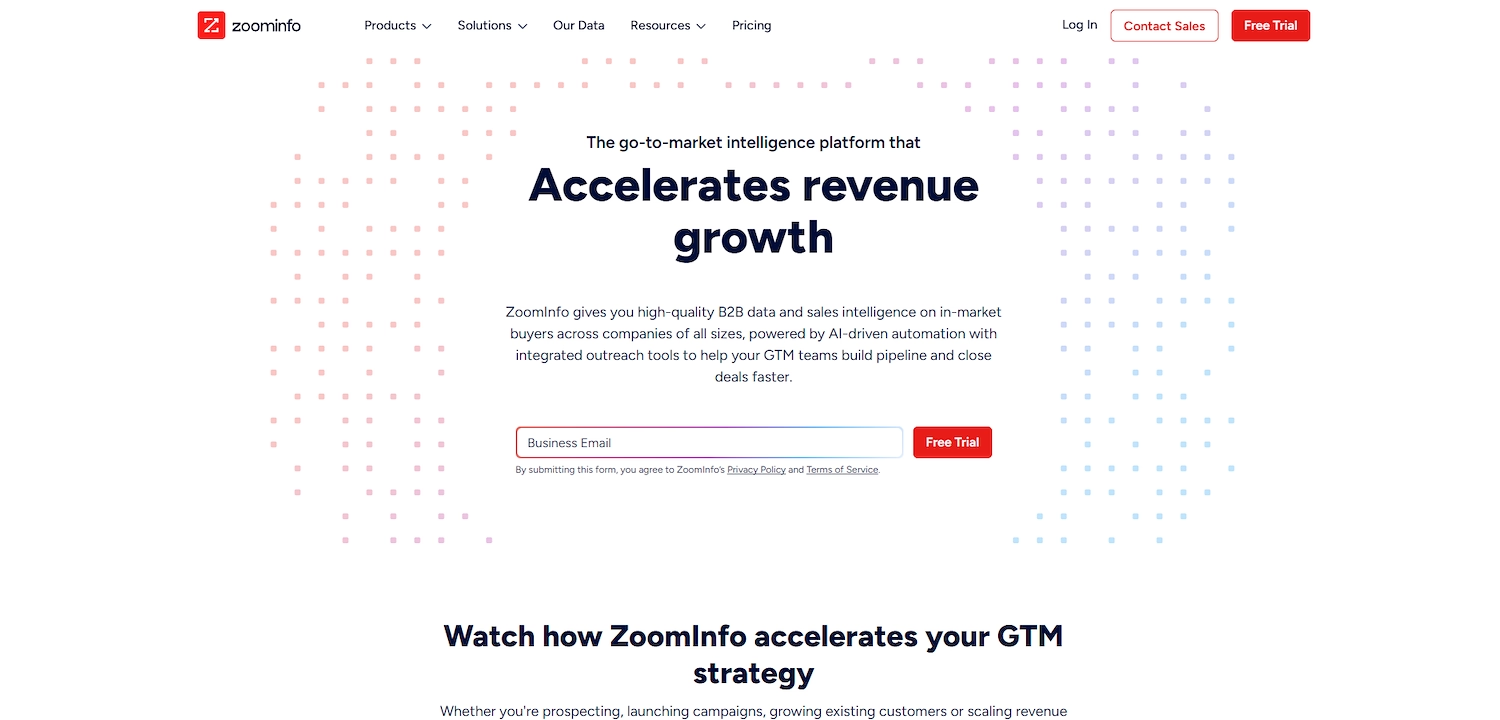
ZoomInfo Sales is a B2B intelligence platform that provides a database of contact and company information. It helps sales, marketing, and recruitment teams identify and connect with their target audience.
Users build prospect lists, enrich CRM data with accurate contact details, and find decision-makers. The platform also supports territory plans and account-based marketing strategies.
ZoomInfo Sales's Main Features
- Surfaces buying committees and writes outreach copy with a generative-AI assistant.
- Analyzes customer interactions to provide sales insights.
- Identifies anonymous visitors on a company's website to generate leads.
- Surfaces in-market prospects based on their online activity and intent signals.
ZoomInfo Sales vs. Findymail: Key Differences
Average Review Score: 4.5/5 stars based on 8,738 G2 reviews.
- ZoomInfo Sales includes a generative-AI assistant that recommends who to contact and what to say. This is a feature for sales guidance that Findymail does not offer.
- It identifies anonymous visitors on a company's website to create new leads. Findymail, in contrast, requires you to know the prospect or company first.
- The platform analyzes sales calls and meetings to provide insights. This function supports sales coaching, which is outside the scope of Findymail's email discovery.
- The tool provides a broader range of data, including direct phone numbers and company intelligence. This offers more contact channels than Findymail, which focuses specifically on email addresses.
ZoomInfo Sales Limitations Compared To Findymail
- Some users find that the contact data in ZoomInfo Sales is occasionally outdated. This differs from Findymail, which focuses on verified emails to ensure low bounce rates.
- As a broad go-to-market platform, the tool can be complex for teams that only need to find emails. Findymail, in comparison, provides a focused user experience for this specific task.
- Its all-in-one design may lead to costs for features a team does not use if they have an existing sales stack. Findymail's model lets it integrate into a workflow, which can avoid payment for redundant tools.
Pricing and Cost-Effectiveness
ZoomInfo Sales does not publicly list its prices, as it operates on a custom-quote basis for annual contracts. This model differs from Findymail's transparent monthly plans. For a specific quote, you must contact their sales team through the official website.
Consider 11x For Sales Tasks
If your team wants to delegate sales tasks, 11x provides digital workers for prospecting and outreach. This approach can support your sales force with automated functions. See if its AI agents are a good fit for your operational needs.
At 11x, we use AI to run your sales playbook. Alice finds prospects and manages outreach, while Julian qualifies leads and schedules meetings. Our platform unifies data enrichment, outreach, and email warmup, which can replace several tools in a conventional GTM stack.
Book a demo to see it in action.
6) RocketReach
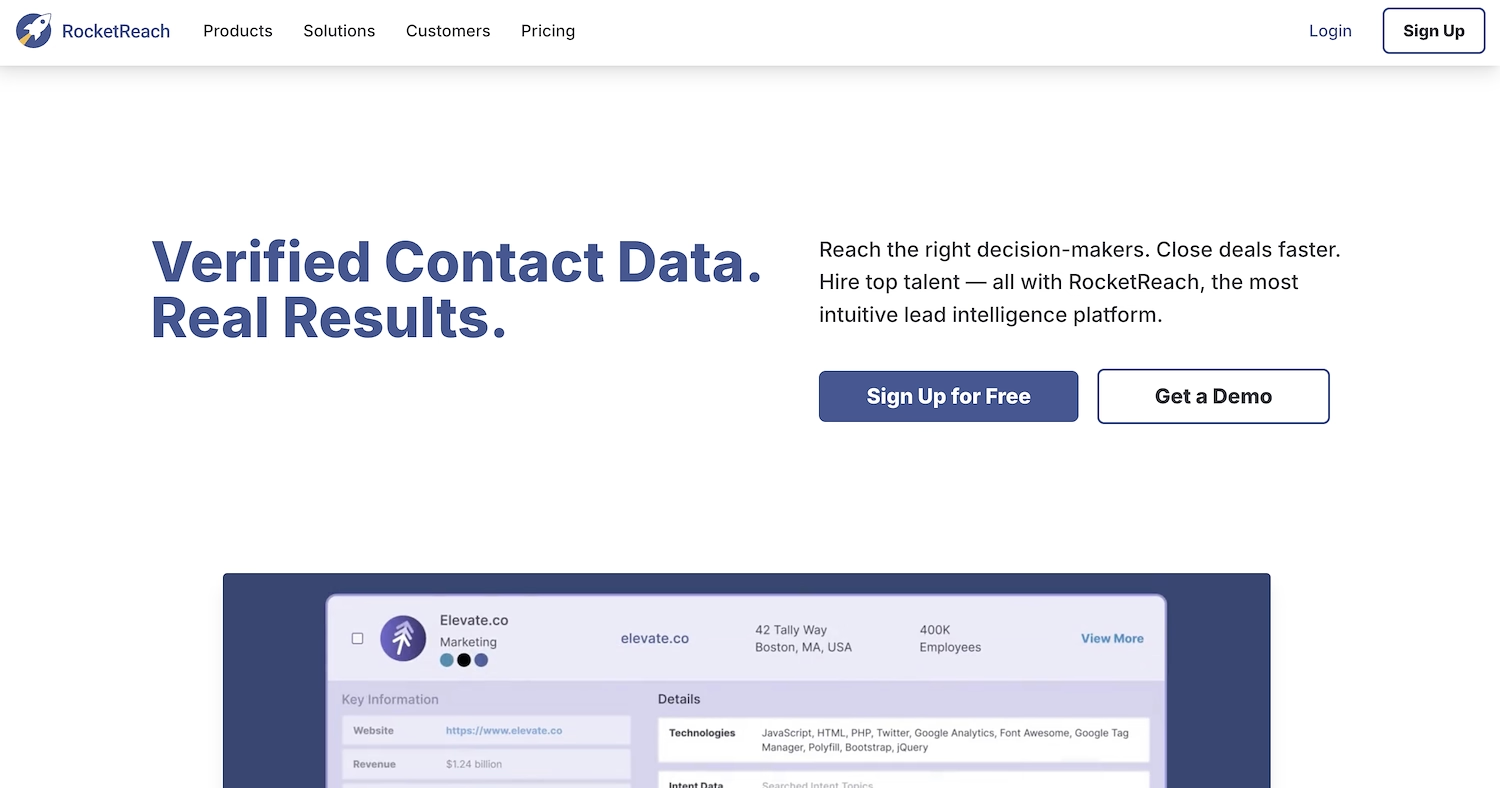
RocketReach offers a database of professional and company profiles. Users can look up contact details, which include emails, phone numbers, and social links for individuals at scale.
The platform supports sales, marketing, and recruitment functions. It is a resource to build contact lists for targeted outreach and talent acquisition.
RocketReach's Main Features
- Searches a database of professional and company profiles at scale.
- Finds contact details that include emails, phone numbers, and social links.
- Integrates with popular CRMs and offers a bulk lookup tool.
- Provides a browser extension to find contacts from company websites and LinkedIn.
RocketReach vs. Findymail: Key Differences
Average Review Score: 4.4/5 stars based on 918 G2 reviews.
- RocketReach provides direct phone numbers and social media links in addition to emails. This offers more contact channels compared to Findymail, which focuses exclusively on email discovery.
- It offers access to a large database of over 700 million professional profiles. This is a different approach from Findymail, which finds and verifies emails in real-time rather than pulling from a large, pre-existing list.
- The platform includes a free plan for users to test the service with a few lookups. In contrast, Findymail is a paid-only service without a free usage tier.
- This tool provides specialized contact data for specific sectors, such as healthcare professionals. Findymail operates as a more general B2B tool without this level of industry-specific focus.
RocketReach's Limitations Compared To Findymail
- Some users report that RocketReach's contact data is sometimes outdated. This may lead to a higher bounce rate compared to Findymail, which focuses on real-time email verification to ensure accuracy.
- The platform provides phone numbers and social links in addition to emails. Teams that only need verified email addresses might find Findymail's focused approach simpler for their workflow, as it avoids paying for extra contact types.
- Its pricing model can be less cost-effective for bulk email discovery. The Essentials plan provides 100 lookups for $99 per month. Findymail, by comparison, offers 1,000 emails for $49, which results in a lower cost per contact.
Pricing and Cost-Effectiveness
RocketReach's Essentials plan is priced at $99 per month for 100 lookups. For the same price, Findymail's Starter plan provides 5,000 emails. This positions Findymail as a more cost-effective choice for teams focused on high-volume email discovery.
7) LeadIQ
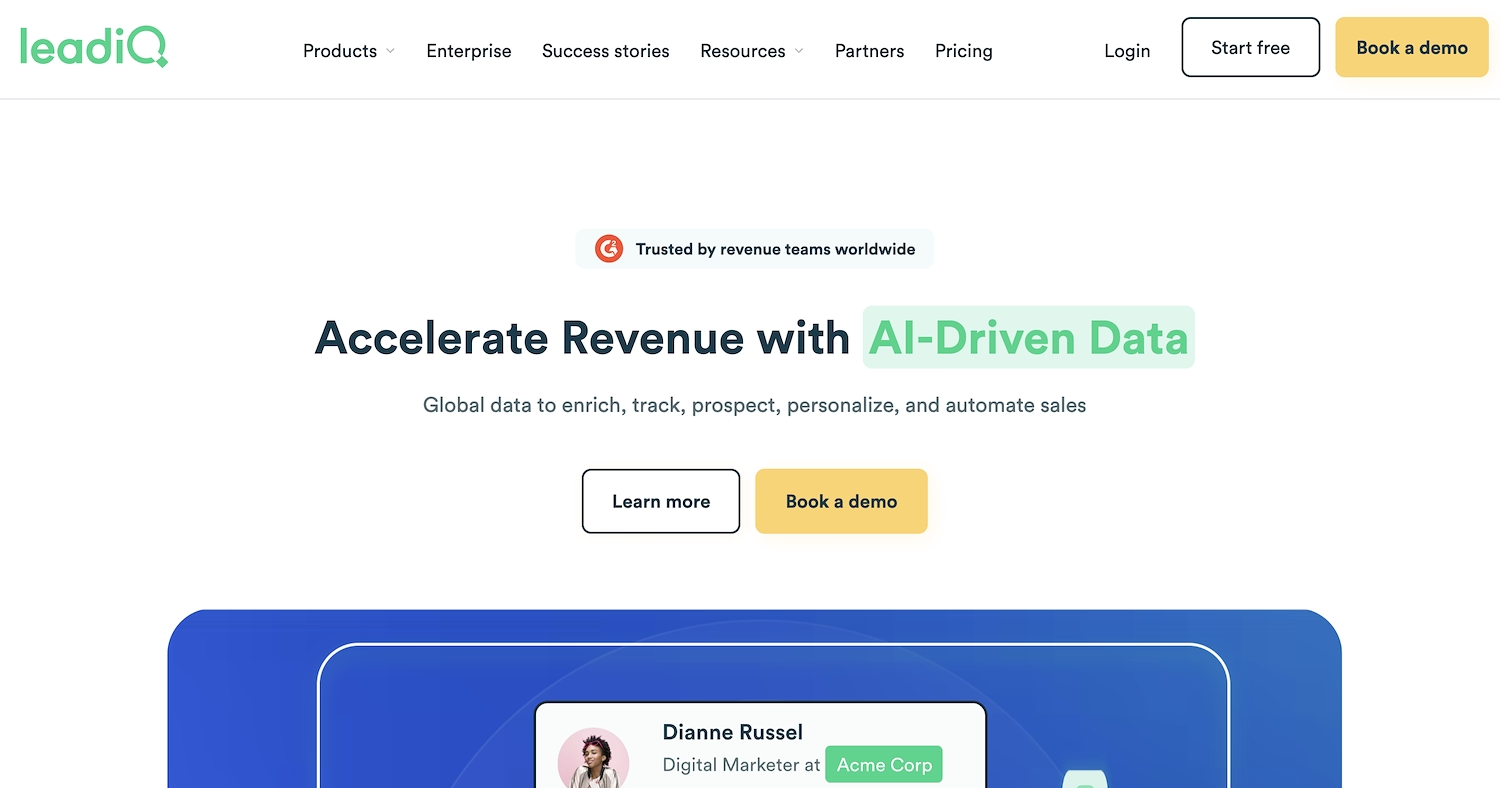
LeadIQ is a sales prospecting platform that helps teams find and capture contact data. Sales professionals use it to source verified emails and phone numbers from websites like LinkedIn. The tool creates prospect lists and enriches CRM records with current contact information to support outbound sales efforts.
LeadIQ's Main Features
- Generates personalized outreach messages with an AI-powered tool called Scribe.
- Tracks job changes and promotions with an automated champion-tracking feature.
- Surfaces buying signals such as funding rounds and G2 intent data.
- Captures contact data from LinkedIn with one click and syncs it to CRMs like Salesforce and HubSpot.
LeadIQ vs. Findymail: Key Differences
Average Review Score: 4.2/5 stars based on 1,097 G2 reviews.
- LeadIQ provides direct phone numbers in addition to emails. This offers another way to contact prospects, unlike Findymail, which focuses only on email discovery.
- It includes an AI tool called Scribe to help write personalized outreach messages. This is a sales assistance feature that Findymail does not offer.
- The platform tracks job changes and surfaces buying signals from intent data. This gives users proactive lead alerts, a feature not present in Findymail's workflow.
- A free plan is available for users to test the service with a limited number of credits. In contrast, Findymail is a paid-only service and does not have a free option.
LeadIQ's Limitations Compared To Findymail
- Some users note that LeadIQ's verification can be inconsistent, which may require manual checks. This is different from Findymail, which focuses on providing only verified contacts to maintain low bounce rates.
- The platform bundles email finding with features like an AI message writer and job-change tracking. Teams with existing tools for these tasks might find Findymail's focused service a more direct fit for their workflow.
- Its credit system applies to various actions, not just email lookups. In contrast, Findymail's credits are used only for verified emails, which offers more straightforward value for teams focused on email acquisition.
Pricing and Cost-Effectiveness
LeadIQ's Essential plan at $45 per month is priced slightly below Findymail's $49 Basic plan. While the monthly costs are comparable across tiers, Findymail provides a set number of verified emails, offering a straightforward cost-per-contact for teams focused on email acquisition alone.
8) Clearbit
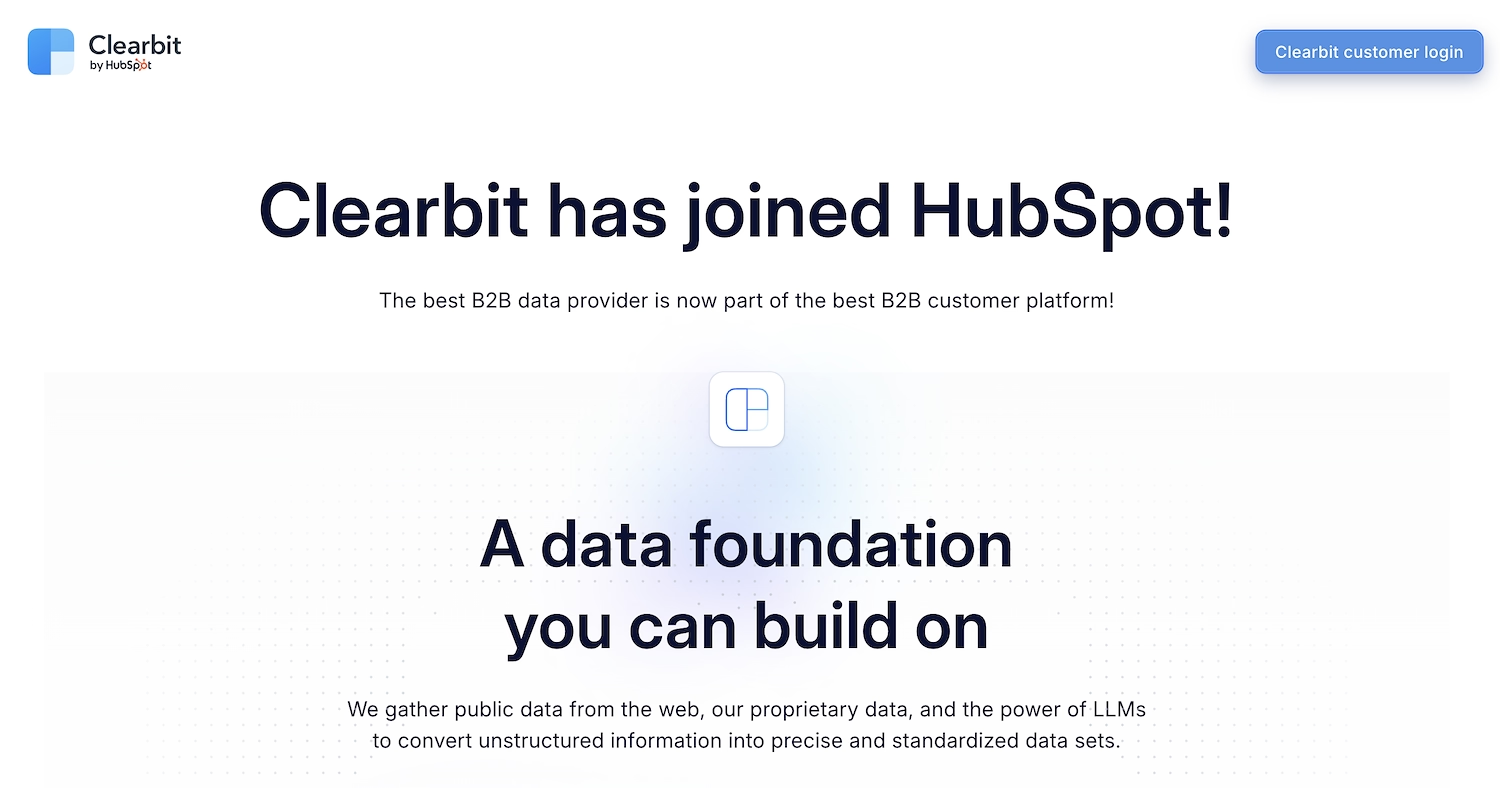
Clearbit is a marketing data platform for B2B companies. It provides tools to enrich records, identify anonymous website visitors, and find new prospects. Teams use the data to understand their customers and personalize outreach across sales and marketing campaigns.
Clearbit's Main Features
- Enriches records by appending over 100 data points on a company and its employees.
- Identifies anonymous companies visiting a website and detects their intent signals.
- Integrates with marketing automation platforms to shorten forms and enrich leads.
- Provides a suite of business intelligence APIs to support data-driven workflows.
Clearbit vs. Findymail: Key Differences
Average Review Score: 4.4/5 stars based on 626 G2 reviews.
- Clearbit enriches records with over 100 data points, such as company size and technology used. This is different from Findymail, which focuses only on providing a verified email address.
- It identifies anonymous companies that visit your website, creating a new source of leads. Findymail, in comparison, requires you to know the prospect or company first.
- The platform integrates with marketing automation tools to shorten web forms in real time. This is a lead conversion feature not found in Findymail.
- This tool detects intent signals from website visitors to find active buyers. In contrast, Findymail is built for direct email discovery and does not analyze user intent.
Clearbit's Limitations Compared To Findymail
- Some users report that Clearbit's data can be outdated because it is a large, aggregated database. This is different from Findymail, which verifies emails in real-time to ensure a lower bounce rate.
- Clearbit is a comprehensive marketing intelligence platform, not just an email finder. For teams that only need to find contact emails, Findymail's focused and simpler interface may be a better fit for their workflow.
- The platform's pricing is based on its full suite of data enrichment and marketing tools. This can be less cost-effective for teams that only need email discovery, as Findymail's pricing is tied directly to the number of verified emails you get.
Pricing and Cost-Effectiveness
Clearbit operates on a custom-quote basis and does not list its prices publicly. This model differs from Findymail's transparent monthly plans. For accurate pricing, you must contact Clearbit through their official website.
9) UpLead
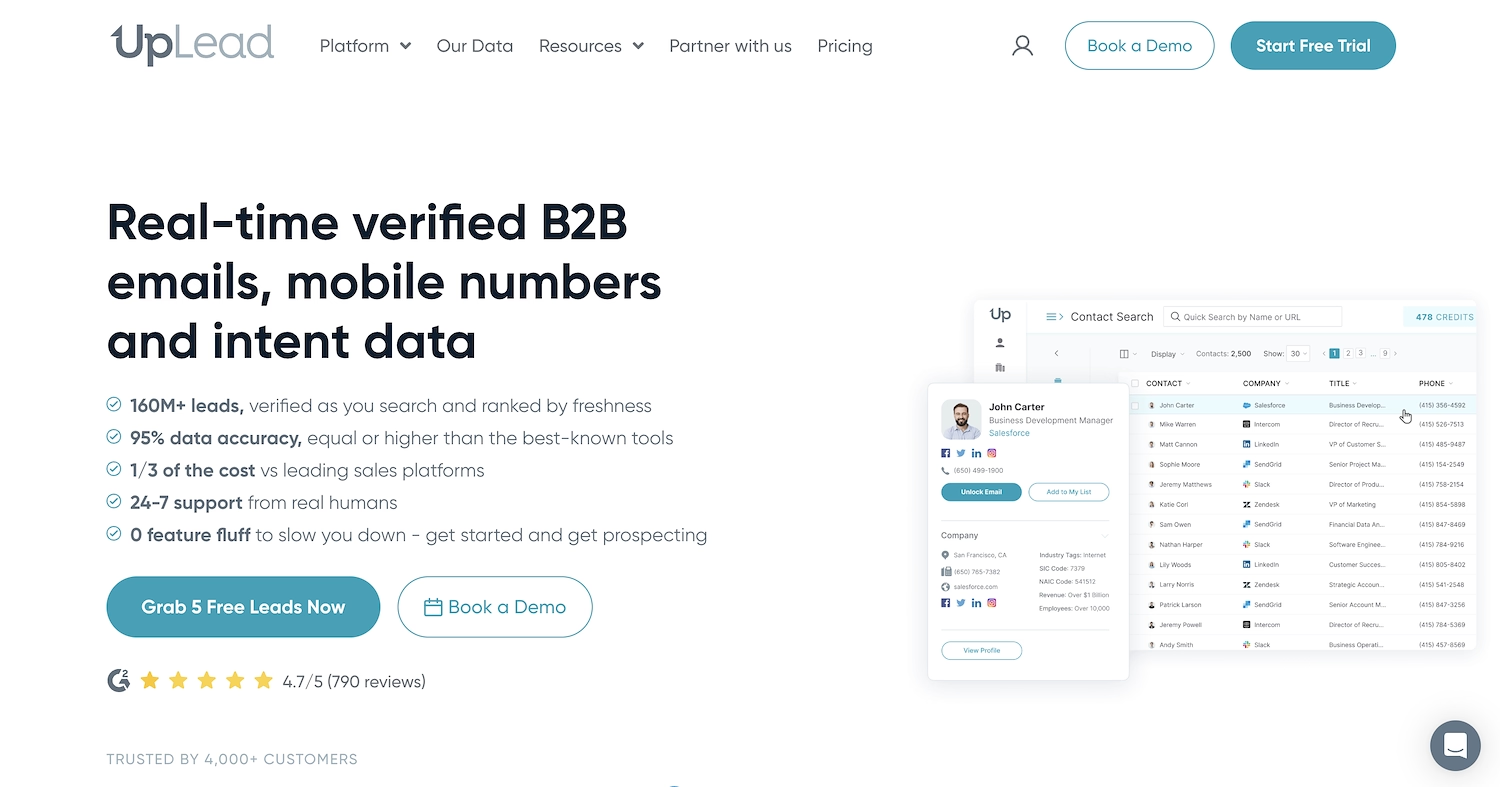
UpLead is a B2B prospecting platform that provides a database of contacts and companies, backed by a 95% data accuracy guarantee. Businesses use the service to build prospect lists and find contact information. The platform verifies emails in real-time to support data quality for sales and marketing efforts.
UpLead's Main Features
- Builds prospect lists using more than 50 search filters, including intent data to find in-market buyers.
- Provides mobile numbers and company data in addition to contact emails.
- Verifies emails in real-time, backed by a 95% data accuracy guarantee.
- Integrates with CRMs like Salesforce and HubSpot, as well as other platforms through Zapier.
UpLead vs. Findymail: Key Differences
Average Review Score: 4.7/5 stars based on 797 G2 reviews.
- UpLead provides a 95% data accuracy guarantee, which offers a specific quality benchmark. Findymail also focuses on accuracy but does not state a formal guarantee.
- It includes direct mobile numbers in addition to emails, giving users an extra contact channel. Findymail, in comparison, focuses only on email discovery.
- The platform has intent data to find prospects who are actively researching solutions. This is a proactive lead-sourcing feature that Findymail does not offer.
- Users can build lists with more than 50 search filters for detailed targeting. This is different from Findymail, which has a more direct search for specific contacts.
UpLead's Limitations Compared To Findymail
- UpLead is a broad prospecting platform with many features. This can make the tool more complex for teams that only need to find emails, compared to Findymail's focused interface.
- The platform's pricing model can be less direct for pure email discovery. Findymail's plans offer a clear cost per email, which might be more cost-effective for high-volume email acquisition.
- Some users report that contact information can sometimes be outdated. This is different from Findymail, which focuses on a real-time verification process to ensure a low bounce rate.
Pricing and Cost-Effectiveness
UpLead's Essentials plan and Findymail's Starter plan are both priced at $99 per month. For this price, Findymail provides 5,000 verified emails, while UpLead's credits apply to its full suite of features. This makes Findymail a more cost-effective choice for teams focused on high-volume email acquisition.
10) Seamless.ai
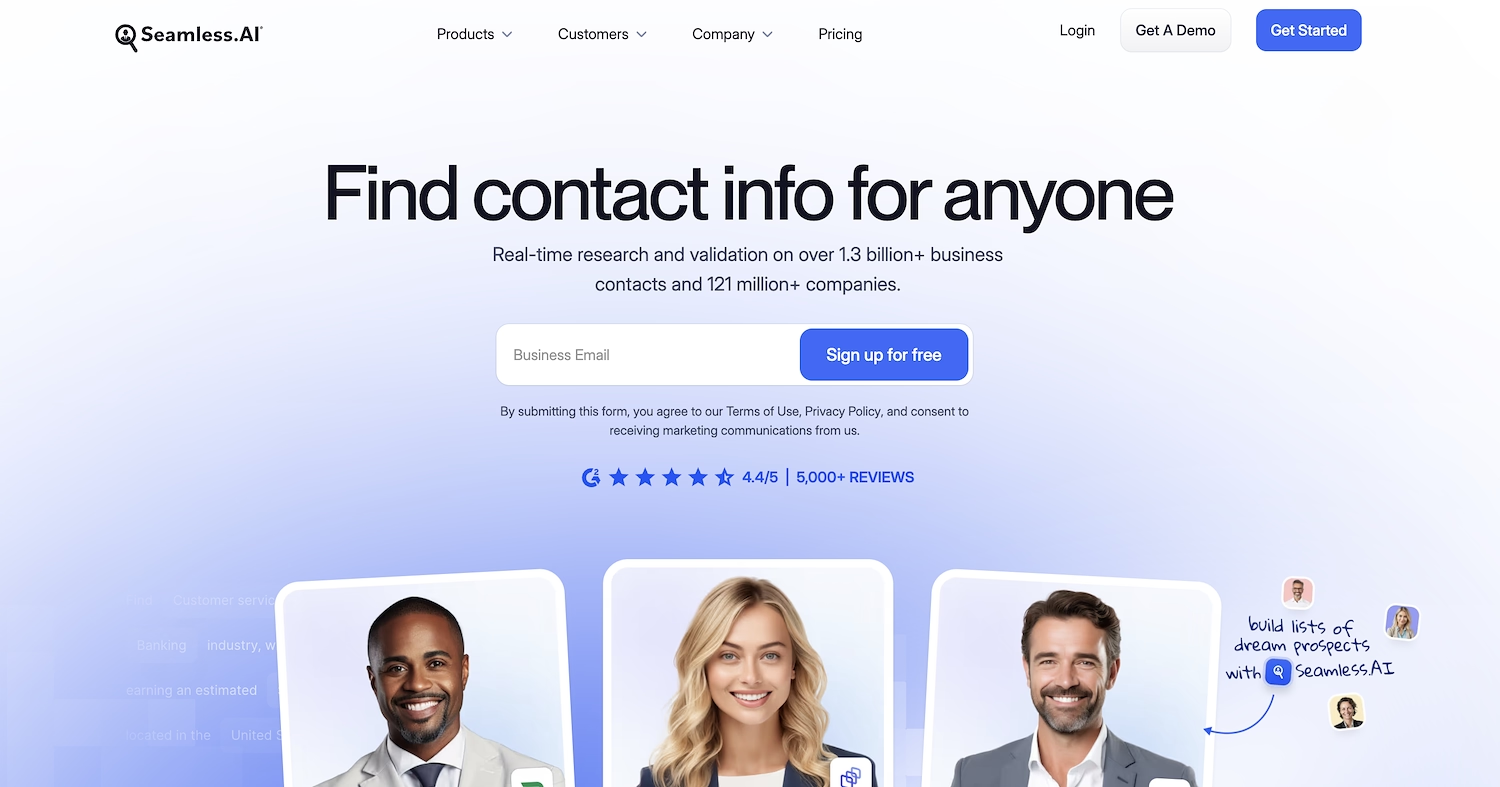
Seamless.ai is a real-time search engine for B2B contact and company data. The platform helps sales and marketing teams find verified emails, phone numbers, and company information. Users build prospect lists, get insights on accounts, and connect the data directly to their CRM to support sales activities.
Seamless.ai's Main Features
- Builds prospect lists using a database of over 1.7 billion contacts and 150 million company profiles.
- Integrates with CRMs and other sales tools, including Salesforce, HubSpot, and Salesloft.
- Provides lead intelligence data, such as buyer intent signals and job changes.
- Cleans and enriches existing data to maintain lead quality.
Seamless.ai Vs. Findymail: Key Differences
Average Review Score: 4.4/5 stars based on 5,067 G2 reviews.
- Seamless.ai provides direct phone numbers in addition to emails. This offers another contact channel, unlike Findymail, which focuses only on email discovery.
- The platform searches a database of over 1.7 billion contacts in real time. This differs from Findymail's approach of finding and verifying emails for specific targets.
- It includes lead intelligence features like buyer intent data and job change alerts. This helps users find active prospects, a function not present in Findymail.
- This tool can also clean and enrich existing data in a CRM. Findymail, in comparison, is built to find new contact information, not manage existing records.
Seamless.ai's Limitations Compared To Findymail
- Some users report that Seamless.ai's contact data can be outdated. This is different from Findymail, which focuses on real-time verification to provide highly accurate emails and keep bounce rates low.
- The tool is a broad platform with many features. For teams that only need to find emails, Findymail offers a more direct and simpler user experience focused on that single task.
- Its all-in-one design may lead to costs for features a team does not use. Findymail's pricing is tied directly to the number of verified emails, which can be more cost-effective for teams focused only on email acquisition.
Pricing and Cost-Effectiveness
Seamless.ai operates on a custom-quote basis and does not list its prices publicly. This model differs from Findymail's transparent monthly plans. For specific pricing, you must contact their sales team through Seamless.ai's official website.
Which One Should You Go With?
Choosing the right Findymail alternative depends on your team's specific needs, budget, and existing sales stack. This guide reviewed several top options to help you evaluate which tool best fits your workflow and business goals.
If you want to delegate sales tasks, consider 11x. Its AI agents can manage prospecting, outreach, and lead qualification, which supports your sales team by handling specific operational functions.




